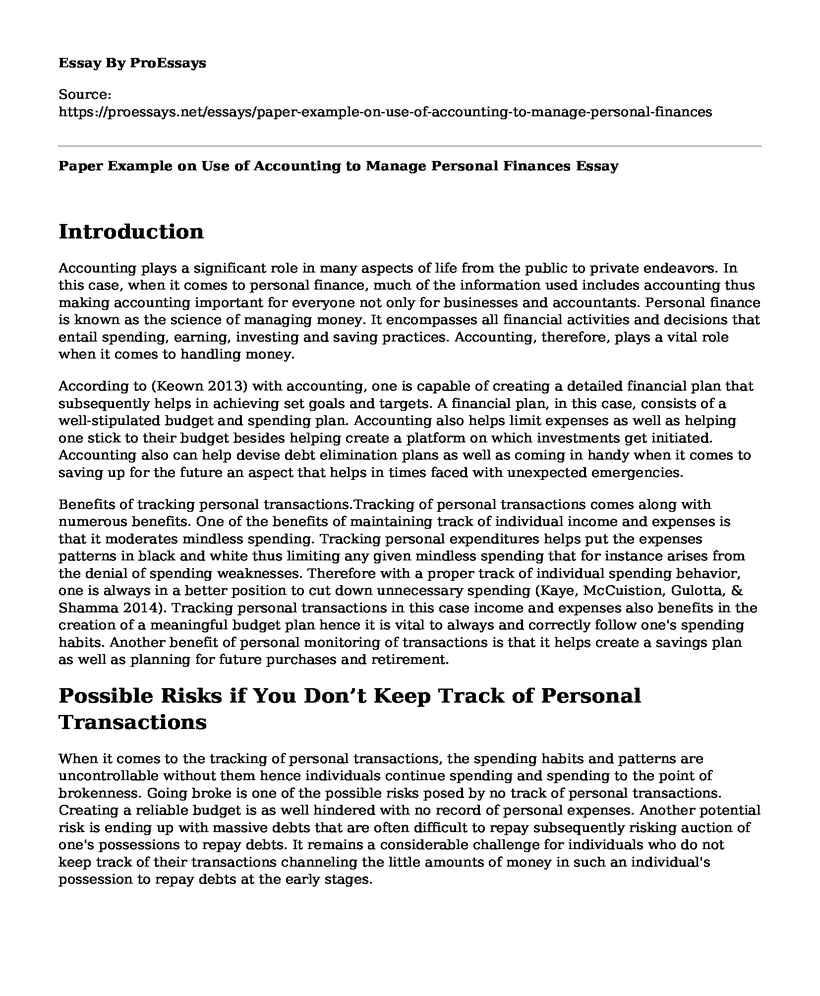Introduction
Accounting plays a significant role in many aspects of life from the public to private endeavors. In this case, when it comes to personal finance, much of the information used includes accounting thus making accounting important for everyone not only for businesses and accountants. Personal finance is known as the science of managing money. It encompasses all financial activities and decisions that entail spending, earning, investing and saving practices. Accounting, therefore, plays a vital role when it comes to handling money.
According to (Keown 2013) with accounting, one is capable of creating a detailed financial plan that subsequently helps in achieving set goals and targets. A financial plan, in this case, consists of a well-stipulated budget and spending plan. Accounting also helps limit expenses as well as helping one stick to their budget besides helping create a platform on which investments get initiated. Accounting also can help devise debt elimination plans as well as coming in handy when it comes to saving up for the future an aspect that helps in times faced with unexpected emergencies.
Benefits of tracking personal transactions.Tracking of personal transactions comes along with numerous benefits. One of the benefits of maintaining track of individual income and expenses is that it moderates mindless spending. Tracking personal expenditures helps put the expenses patterns in black and white thus limiting any given mindless spending that for instance arises from the denial of spending weaknesses. Therefore with a proper track of individual spending behavior, one is always in a better position to cut down unnecessary spending (Kaye, McCuistion, Gulotta, & Shamma 2014). Tracking personal transactions in this case income and expenses also benefits in the creation of a meaningful budget plan hence it is vital to always and correctly follow one's spending habits. Another benefit of personal monitoring of transactions is that it helps create a savings plan as well as planning for future purchases and retirement.
Possible Risks if You Don’t Keep Track of Personal Transactions
When it comes to the tracking of personal transactions, the spending habits and patterns are uncontrollable without them hence individuals continue spending and spending to the point of brokenness. Going broke is one of the possible risks posed by no track of personal transactions. Creating a reliable budget is as well hindered with no record of personal expenses. Another potential risk is ending up with massive debts that are often difficult to repay subsequently risking auction of one's possessions to repay debts. It remains a considerable challenge for individuals who do not keep track of their transactions channeling the little amounts of money in such an individual's possession to repay debts at the early stages.
References
Kaye, J. J., McCuistion, M., Gulotta, R., & Shamma, D. A. (2014, April). Money talks: tracking personal finances. In Proceedings of the SIGCHI Conference on Human Factors in Computing Systems (pp. 521-530). ACM.
Keown, A. J. (2013). Personal finance. Pearson.
Cite this page
Paper Example on Use of Accounting to Manage Personal Finances. (2022, Apr 02). Retrieved from https://proessays.net/essays/paper-example-on-use-of-accounting-to-manage-personal-finances
If you are the original author of this essay and no longer wish to have it published on the ProEssays website, please click below to request its removal:
- Volatile Exchange Market in the United States Paper Example
- The Economic Implications of Government Control Over the Interest Rates Essay
- The Accounting Profession and Bankrate Case Paper Example
- Bank Change Management Case Study
- Essay Example on Dream Big, Aim High: My Path to Becoming a CPA and CFP
- Essay on Bank of America (BAC): Financial Services Giant With Average Earnings of 2.83 and Revenue 91.74B.
- Essay Sample on Financial Instability: A Growing Challenge for College Students







